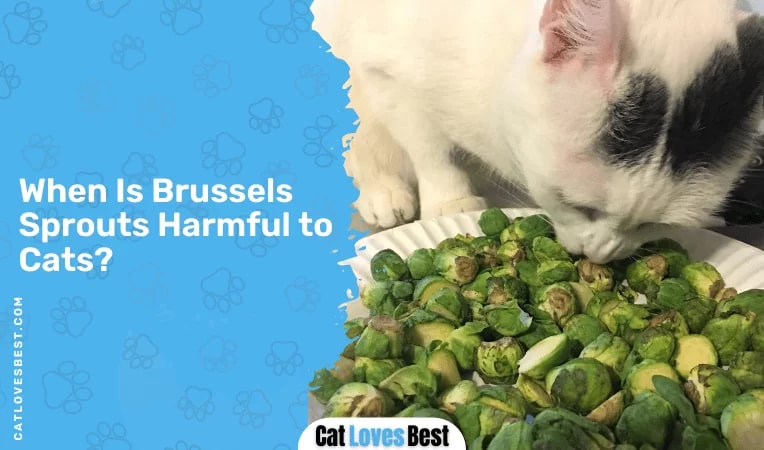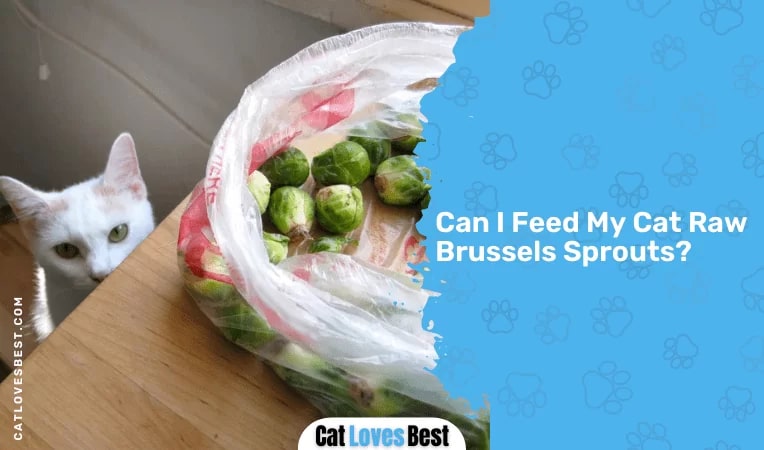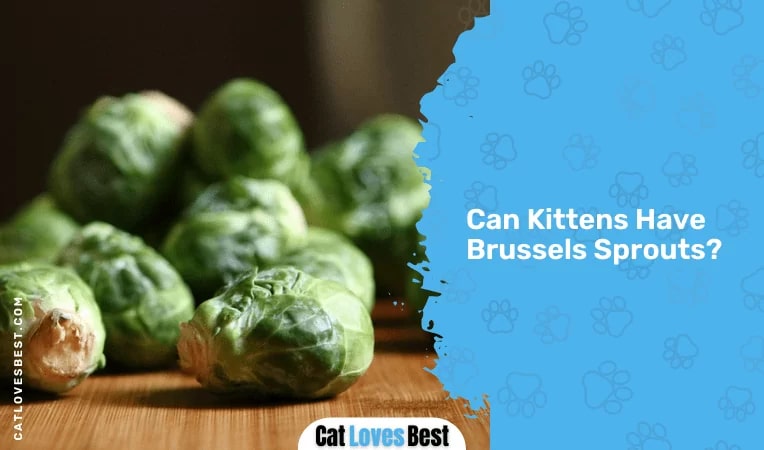When it comes to veggies and fruits some pet parents believe they can share them with their kitty to give extra nutrients and benefits to them which can boost their immune system.
We often wonder whether it’s fine to offer veggies and fruits to our feline pals to make sure that they get all the nutrients they need.

Let’s find out can cats eat Brussels sprouts? Is it healthy for them?
Scroll down, to get in-depth knowledge about the sprouts and other related topics we have covered which will help you in a better way.
Can Cats Have Brussels Sprouts?
The short answer is yes, cats can safely eat Brussels sprouts in small quantities. In fact, it’s non-toxic, so it won’t harm them, but you shouldn’t give too much because, unlike humans, cats don’t require the same nutrient value for a well-functioning system. Plus, too much of this veggie might lead to health issues such as bloating, vomiting, stomach ace, and digestive-related issues.
Moreover, veggies are not considered the main diet for cats, they already get enough essential nutrients from their regular meal which includes meat, chicken, animal products, etc. Even if you occasionally feed her Brussels sprouts are perfectly fine.
Is Eating Brussels Sprouts Healthy for Cats?
Brussels sprouts belong to the cabbage family and contain numerous nutrients like vitamin K & C, protein, dietary fiber, minerals, and antioxidants.
Fiber aids in digestion issues and prevents diarrhea and constipation. On the other hand, antioxidants have the ability to neutralize harmful chemicals and are also used in the treatment of chronic illnesses.
All you need to do is be careful while feeding your kitty it is not harmful but still make sure they are boiled and finely chopped to avoid health issues which will discuss in detail in our upcoming section.
When Is Brussels Sprouts Harmful to Cats?
As mentioned at the beginning that Brussels sprouts are non-toxic to cats. However, it solely depends on how it has been cultivated. In other words, Brussels sprouts are generally grown in warm humid environments, sometimes pesticides are added to the cultivation process but still, there are chances of bacterial growth on the land.
You cannot vouch for fresh Brussels sprouts every time like with no bacteria so for that you have to wash them thoroughly and boil them to kill all the bacteria. Plus, keep an eye on your feline pal so that she does not overconsume it or eat raw ones or have to face health consequences.

Therefore, common symptoms to look out for are stomach ache, vomiting, diarrhea, loss of appetite, bloating, and choking hazard.
To avoid such health complications it is always suggested to monitor your feline when feeding something new and not let her eat more than the required quantity. If in case, your feline encounter any symptoms, immediately seek the vet’s help for a speedy recovery.
Can I Feed My Cat Raw Brussels Sprouts?
No, you heard it right, you should never serve raw Brussels sprouts to your kitty because it contains harmful bacteria which you have to kill by bringing them to a boil.
These sprouts have micro size bacteria that we cannot see through our naked eyes, even after washing them thoroughly you need to boil them to avoid food poisoning.

For instance, if in your absence or something your feline manages to nibble raw Brussels sprout, and you have a doubt whether she has injected or not.
In such a scenario, observe her for the next 72 hours you will notice bacterial illness symptoms such as vomiting, fever, stomach pain, diarrhea, and muscle pain.
If you notice any of the above symptoms immediately even though they are showing minor symptoms seek the vet’s help and start the medication to avoid future severe health consequences.
Can I Give My Cat Brussels Sprouts as a Treat?
Even though Brussels sprout is safe for your kitty and contains all the essential nutrients, it doesn’t mean that you can replace it with a regular diet.
Unlike humans, felines’ body systems don’t require the same nutritional level to function well. This is because they already get it from their regular meal which includes more meat, chicken, salmon, etc.
So, go ahead if you only want to serve Brussels sprouts as treat.
Furthermore, make sure that you wash them thoroughly, and chop them finely. Then you can serve these steam finely chopped sprouts to your feline pal.
Also Read: Do Cats Eat Broccoli
Can Cats Have Roasted Brussels Sprouts?

Thinking to bring some moderation to your feline’s meal? Wanna try some veggies? Well, let’s try some experiments with Brussel sprouts.
As discussed above, Brussels sprouts are safe for your feline, apart from feeding raw or plain sprouts. You can also do one thing, simply roast them and serve them as a crispy treat to your feline pal. These roasted veggies are beneficial to your kitty’s health.
Just make sure before bringing any change in your kitty’s diet or adding any side dish consult the vet for better guidance.
Your kitty can have a bite of roasted Brussels sprouts, but it should be chopped finely and cooked softly. So that she can have it without facing any choking issues.
Can I Give My Cat Brussels Sprouts Pate?
As we know, Brussels sprouts are safe for your feline, but what about seasoning dishes made from them.
Well, the answer is no, because pate dish contains a variety of ingredients which is harmful to your feline to ingest. Ingredients such as flour, garlic, onions, spices, and other seasonings give a delicious taste.
So, it’s advisable to simply avoid such experiments with your feline, even a small bite is prohibited.
Can Kittens Have Brussels Sprouts?

Brussels sprouts are one of the non-toxic veggies, which your little furry pal can safely have without damaging the body system.
As per the survey, it has been observed that sprouts work as a mini powerhouse for felines it includes essential nutrients. Plus, you can add it to her diet chart like mix it with food, add as toppings, etc.
A friendly piece of advice for you before feeding to your little munchkin make sure that it is chopped finely and steamed or cooked well. It will help to prevent choking issues and your kitten will easily be able to digest it.
Also read: Can kittens eat vegetables?
FAQs
Can cats eat cooked Brussels sprouts?
One of the best ways to feed your kitty Brussels sprout is cooked. Felines cannot break down the cell wall inside the plant, and if it is cooked or steamed well make it easier for her to chew and digest. Also, one of the benefits of cooking Brussels sprout is that it helps to kill the bacteria which we cannot see with our naked eyes.
What kind of sprouts can cats eat?
Here are a few examples of sprouts that you can safely feed to your feline pal such as reddish, broccoli, pea, sunflower sprout, etc. All contain dietary fiber, protein, calcium, and vitamin A & C which are healthy for your feline pal.
Can cats eat frozen Brussels sprouts?
Brussels sprouts are non-toxic for your cat, you can safely feed her. If you wish to feed her frozen one then first bring it to the room temperature. This is because if you serve her directly from the fridge it will create a sensitivity issue and she won’t be able to enjoy her food.
Can cats eat Brussels sprout leaves?
Yes, your feline pal can eat Brussels sprout leaves, there is no harm in nibbling a few of them. This is because Brussels sprout leaves are soft and can be easily chewed by your kitty. But, make sure they are finely chopped and cooked well before serving to your feline pal.
Well, That’s a Wrap!
Here we would like to conclude our blog on can cats eat Brussels sprouts. Confidently, we were able to serve you the appropriate content, which also includes nutrient value breakage.
Brussels sprouts are non-toxic for your kitty’s health, you can feed her on an occasional basis.
If you want your kitty to have a bite of it make sure you offer it in small quantities and chop it into small pieces so that it doesn’t choke her. Also, remember to cook the Brussels sprouts before you serve them to your kitty.
Also Read: Cats Eat Cabbage
References:
- Types of Cat Grass You Can Grow – PetMD
- Feeding Your Cat – Cornell UniversityCollege of Veterinary Medicine
- What every pet owner should know about food allergies – Clinical Nutrition Service

